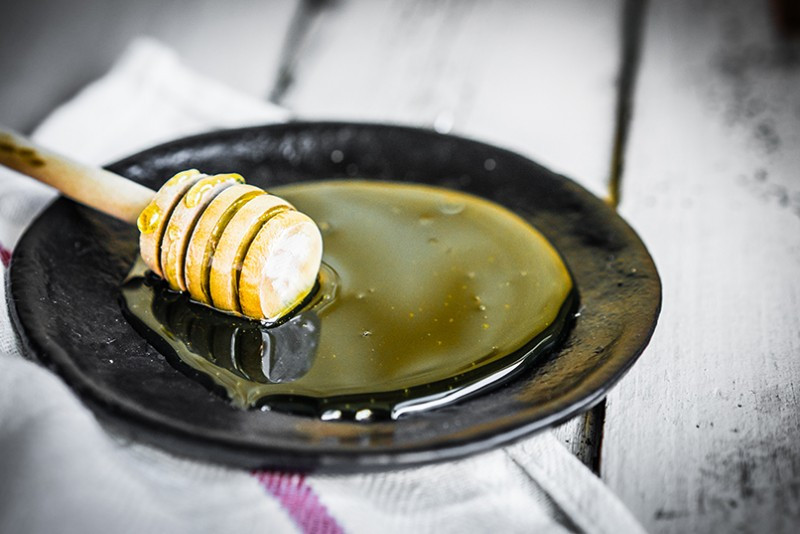Having trouble sleeping at night? Looking for another source of energy for the big race? Allergies got you down? That nagging cough won't go away? On and on that list goes, and as you might have guessed, there is one substance out there that can tackle all those issues, and more, even if it takes its sweet time getting the work done. We're talking about honey, and not just that heavily processed, often chemically refined form of honey that you find on the shelves of most groceries. In this case we're talking about raw honey, which, as described by draxe.com, is that "crude form of honey immediately taken out of the cells within a bee hive." This is done by pumping smoke into the beehive, chasing lurking bees away. In its natural form such as this, honey typically includes the presence of bee pollen and propolis. Both have attributes that promote good health; for example, the consumption of pollen can help the consumer build up an immunity to seasonal allergies. And that's just a drop in the bucket, or a drip from the honeycomb, when it comes to raw honey's health benefits. We'll get back to those in a jiffy. It's a good thing for us that bees don't charge by the hour in making pure honey. We'd all be broke. Consider this – worker bees (which are female bees doing the heavy lifting on behalf of their leader, the queen bee) are known to work thousands of hours and cover tens of thousands of miles in collecting enough pure honey just to make one pound. Bees have been doing this for centuries, dating back even to ancient Egypt and the Pharaohs – it's even mentioned several dozen times in the Bible, such as in the book of Luke, where it says that Jesus Christ rose from the dead and the first food he ate was broiled fish and honeycomb. The question is, why aren't more people rushing out to their local health stores or even their neighbor beekeepers to buy this stuff in place of all that refined sugar we consume? Dr. Ron Fessenden, according to draxe.com, says that the average American consumes more than 150 pounds of refined sugar a year, as well as another 60-plus pounds of high fructose corn syrup annually. Not exactly the healthiest choices. By comparison, only about 1.3 pounds of honey goes down the hatch annually. What's the purpose of knowing all this? To consider making the switch to raw honey, where the health benefits are many. It's a sweetener to be eaten for the right reasons, such as the following:
- It can soothe a sore throat and reduce cough, such as when it's used in concert with warm tea or lemon water. It can even be an effective cough remedy on its own. Just don't give it to children one year and younger, Mayo Clinic cautions—doing so runs the risk of infant botulism.
- Honey has been reported, by Molecules, a journal cited at healthimpactnews.com, as having been shown in research to possibly impact the development of cancers or tumors. Honey's anti-cancer compounds flavonoids and phenolic acids play a vital role in this regard.
- Plaque between the teeth a nuisance? We're not sure how easy it is to get your hands on it, but manuka honey, produced by the manuka plant in New Zealand and Australia, has been proven as effective in reducing the formation of plaque as the chlorhexidine gluconate from regular mouthwash. Imagine that, a sweetener that is good for your teeth. Better yet, don't imagine it. Find it and use it.
- Need some help killing a case of herpes? Turn to honey—a 2004 study in the Medical Science Monitor says that topical honey was "far superior" to the drug acyclovir (aka Zovirax) in treating both lip and genital herpes, per healthimpactnews.com.
- Aids in helping to properly manage weight. Not only has a San Diego State University study shown that replacing sugar with honey can help prevent gaining weight while reducing blood sugar, another study discovered that raw honey activates hormones that diminish appetite.
- Natural source of energy. Honey, according to Dr. Axe, is a carbohydrate that serves as a sporting fuel and can be a welcome energy source both before and after exercise.
- Consumed daily, raw honey can help elevate levels of antioxidants in the body, effectively giving a boost to the immune system. It is these antioxidants that research has shown capable of reducing the risk of heart disease and cancer.
- Sleep aid. A little bit taken before bedtime ought to do the trick. It can create a tiny rise in insulin levels, which starts a chain reaction that in the end produces melatonin, which we already know helps us sleep.
- Bandages soaked in honey, a natural antibacterial, can help heal wounds, burns and skin ulcers.
- Diabetes deterrent, especially when used in concert with cinnamon.

